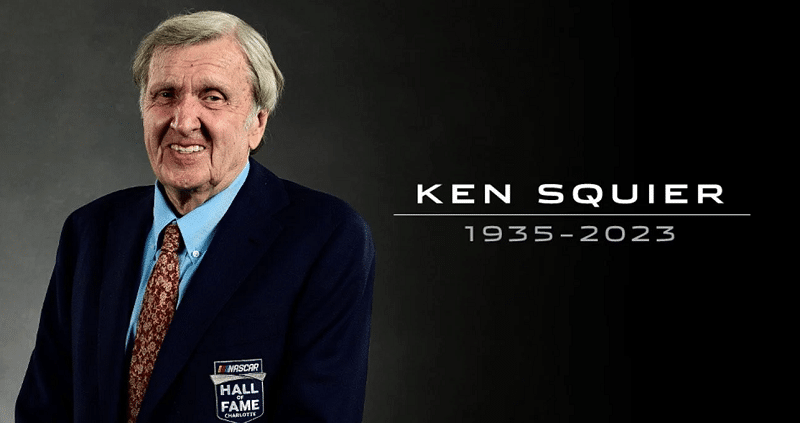Table of Contents

In the world of motorsports, one name that will forever be etched in history is Ken Squier. The iconic NASCAR broadcaster passed away at the age of 88, leaving behind a legacy that transcends the racetrack. In this article, we delve into the life and times of Ken Squier, exploring the circumstances surrounding his passing and the indelible mark he left on the sport he loved.
The Passing of a Legend
On a somber note, Ken Squier bid farewell to the world in Waterbury, Vermont, where he had made his home. His passing marks the end of an era in the racing community, and fans around the world mourn the loss of a true icon.
What Happened To Ken Squier?
Ken Squier may not have been a race car driver himself, but his contributions to NASCAR were immeasurable. He was a beloved figure in the racing world, known for his role as a NASCAR announcer and broadcaster. His dulcet tones graced the airwaves for decades, earning him the affection of fans and racers alike.
One of his most enduring contributions to the sport was coining the phrase ‘The Great American Race.’ This iconic phrase became synonymous with the Daytona 500, one of NASCAR’s premier events. Squier’s ability to capture the essence and excitement of racing through his commentary endeared him to fans across generations.
Ken Squier: More than a Broadcaster
Beyond his work in broadcasting, Ken Squier made a profound impact on the sport of NASCAR. In 1960, he opened Thunder Road Speedway in Vermont, a testament to his commitment to racing and his home state. Vermont Governor Phil Scott, a fellow racer, paid tribute to Squier’s deep devotion to the racing community and his role as a true icon.
NASCAR itself honored Ken Squier by naming its annual media excellence award after him. Winston Kelley, executive director of the NASCAR Hall of Fame, highlighted Squier’s unique ability to connect with fans, describing the human side of NASCAR competitors that he brought to life through his broadcasts.
Who Was Ken Squier?
Kenley Dean Squier, born on April 10, 1935, in Waterbury, Vermont, was a man deeply passionate about motorsports. He earned the moniker of the “Voice of NASCAR” for his detailed commentary on NASCAR races from 1979 to 1997, with broadcasts on CBS and TBS.
Squier’s journey in broadcasting began in the early 1960s in radio, and he later co-founded the Motor Racing Network (MRN) in 1970, focusing on airing NASCAR races. His ascent in the broadcasting world continued as CBS enlisted him as the lap-by-lap commentator in 1979, where he became renowned for his passionate and knowledgeable style.
Some of the most memorable races he covered include the 1979 Daytona 500, the 1992 Winston Cup championship race, and the 1998 Daytona 500. Squier’s dedication extended beyond CBS, as he continued as a NASCAR commentator for TBS until 1999, also serving as a studio host for broadcasts on CBS, TBS, and ESPN.
In recognition of his outstanding contributions, Ken Squier entered the Motorsports Hall of Fame of America in 2010 and the NASCAR Hall of Fame in 2018. These honors underscored his status as a true legend in the world of motorsports.
How Did Vermont Broadcast Legend Ken Squier Die? Cause of Death Revealed
The passing of Ken Squier was confirmed by his friend and colleague, Dave Moody, and later by WDEV, the Vermont radio station he owned. He had recently been placed in hospice care due to health challenges.
While the exact cause of his death has not been publicly disclosed, it is evident that Squier’s impact on NASCAR, especially in the historic 1979 Daytona 500, remains an enduring legacy. Fans and the racing community continue to pay tribute to his remarkable contributions to motorsports.
Ken Squier Obituary
Ken Squier, the iconic NASCAR broadcaster, passed away on Wednesday night at the age of 88, as confirmed by NASCAR on Thursday. Known as the “Voice of NASCAR,” Squier began his illustrious career in 1970, calling races on MRN, CBS, and TBS until 1997.
His unforgettable moment came during the 1979 Daytona 500 when he famously exclaimed, “And there’s a fight,” immortalizing the brawl between Cale Yarborough and Bobby Allison.
Born in Waterbury, Vermont, Squier’s passion for NASCAR extended beyond the microphone, co-founding MRN and playing a pivotal role in bringing the sport to millions during a historic snowstorm broadcast.
Inducted into the NASCAR Hall of Fame in 2018, Squier’s legacy as a storyteller and voice of NASCAR’s greatest moments will be deeply missed by the racing community.
Ken Squier Death and Obituary – FAQs
1. What was the cause of Ken Squier’s death?
Ken Squier passed away, and while the exact cause of death has not been publicly disclosed, his death marks a significant loss in the racing community.
2. When did Ken Squier pass away?
Ken Squier passed away on Wednesday night at the age of 88, as confirmed by NASCAR on Thursday.
3. How did Ken Squier contribute to NASCAR before his passing?
Ken Squier, known as the “Voice of NASCAR,” played a pivotal role in NASCAR broadcasting, calling races on MRN, CBS, and TBS from 1970 to 1997.
4. What iconic moment is associated with Ken Squier’s commentary in NASCAR history?
Ken Squier is famous for his call during the 1979 Daytona 500, where he exclaimed, “And there’s a fight,” capturing the intense post-race brawl.
5. Was there any specific health condition that led to Ken Squier being in hospice care before his death?
Reports indicate that Ken Squier had been transferred to hospice care due to a number of health difficulties in the period leading up to his passing.
As we remember Ken Squier, we celebrate not only his remarkable career but also the warmth and passion he brought to the world of motorsports. His legacy will forever echo through the roar of NASCAR engines and the hearts of racing enthusiasts. Rest in peace, Ken Squier. You will be dearly missed.